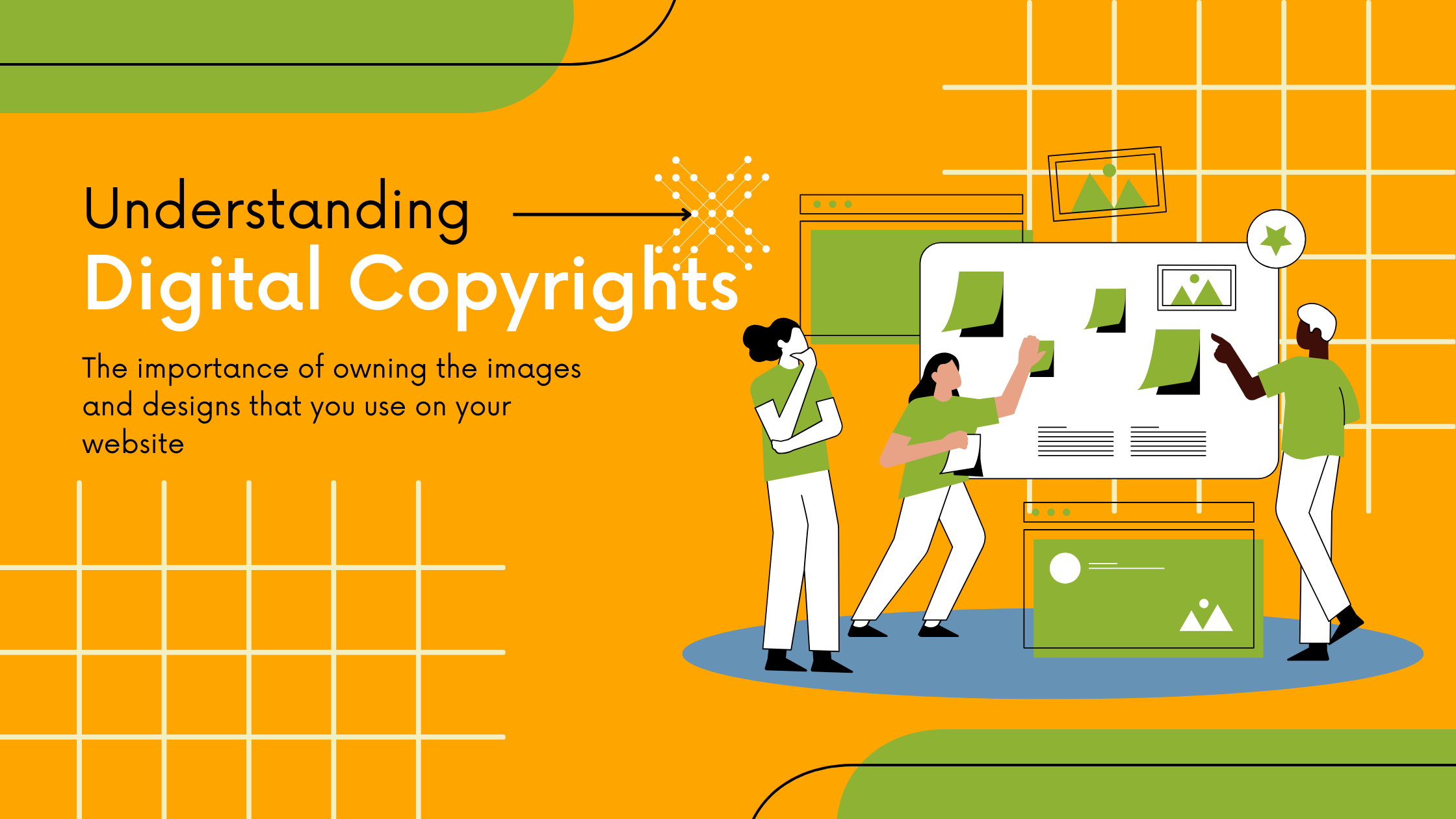
Copyright.
You have probably encountered this term before, but what you may not know is that it’s an important consideration for businesses and marketers of all sizes.
Put plainly, copyright is the legal authority to duplicate, distribute, and display something. Although this may seem straightforward, there can be a lot of nuances to copyright law that are important to know when you are building a website or marketing your company online.
In this blog post, we will discuss the significance of copyrighting and watermarks. Additionally, we'll provide tips on avoiding potential legal repercussions associated with using someone else's work, all while guiding you on creating exceptional original content.
Understanding Copyright and Image Rights
Copyright is a legal term used to describe the rights granted to creators for their work. Under this law, the creator of an original work, which includes photography, graphics, and designs, is automatically granted exclusive rights to their creation as soon as it’s in a tangible form. This means as soon as you click the shutter on your camera or save your digital design, you hold the copyright to that image. These rights include the reproduction, distribution, and display of the image. In simple terms, if you didn’t create it, you don’t own it, and you can’t use it without permission.
For small businesses, this is twofold. Firstly, you must respect the rights of others by not using images you don’t own or have permission to use. Secondly, owning rights to your images can be a valuable asset, offering control over how your business is visually represented online.
Common Misconceptions about Using Images from the Internet
Many people believe that if an image is on the internet, it’s free to use. However, this is far from the truth. Just because an image can be easily downloaded or screenshotted doesn’t mean it’s free for public use. Another common error is assuming that citing the source or photographer is enough to avoid copyright infringement. While this is a good practice, it doesn’t replace the need for permission.
Another common misconception is that using an image for educational or non-profit purposes automatically falls under “fair use.” Fair use is complex and dependent on several factors, including the purpose and character of the use, the nature of the copyrighted work, the amount used, and the effect on the work’s value. It’s not a blanket excuse to use copyrighted material without permission.
The Problem with Watermarks
A watermark is a logo, text, or pattern superimposed onto an image to identify the owner, protect against unauthorized use, and discourage theft. It’s essentially a stamp of ownership. Photographers, artists, and graphic designers commonly use watermarks to safeguard their work from being used without permission or compensation.
Watermarks can range from subtle to prominent, and their primary purpose is to make it difficult for others to use the watermarked work without it being evident that the image is borrowed or stolen. In the digital marketing world, where content can be easily downloaded and redistributed, watermarks act as a deterrent against such unauthorized usage.
NOTE: Just because an image doesn’t have a visible watermark doesn’t mean that it isn’t copyrighted. It’s always better to assume that an image you find online is not free to use.
The Risks of Using Copyrighted Content
The digital age has made it easier than ever to access a vast array of images online. However, this accessibility doesn’t equate to free use. The unauthorized use of copyrighted images poses significant risks to businesses, particularly small businesses that might lack the legal resources of larger corporations. Understanding these risks is crucial for protecting your business.
Legal Implications and Potential Lawsuits
The most immediate risk of using copyrighted images without permission is the legal consequence. When you use someone else’s copyrighted work without authorization, you’re infringing on their exclusive rights. This can lead to legal action from the copyright holder.
Lawsuits for copyright infringement can be costly and time-consuming. They often involve not just the payment of damages but also the costs of legal representation. For a small business, this can be a significant financial strain and can even threaten the survival of the business.
WARNING: Watch out for copyright infringement claim emails that seem suspicious. It’s a common scam to send false copyright notices that contain malicious links, threaten legal action, or ask the recipient to provide personal information or repayment. Always double-check the sender of copyright claim emails and never click on links from senders you don’t recognize.
Financial Risks, Including Fines and Penalties
Apart from legal fees, there are direct financial penalties associated with copyright infringement. These can be substantial, depending on the nature of the infringement. For example, statutory damages for copyright infringement in the United States can range from $750 to $30,000 per work infringed and can go up to $150,000 per work if the infringement is found to be willful.
If the court decides, you may also be responsible for the profits you made as a result of the infringement, as well as the lost profits of the copyright holder. This can add up to a significant amount, particularly if the copyrighted image is a key part of a successful marketing campaign.
Damage to Brand Image
Beyond the legal and financial ramifications, there’s also the risk of damaging your brand’s reputation and credibility. In today’s market, consumers are increasingly conscious of ethical practices in business. Being caught in a copyright infringement scandal can lead to a loss of trust among your customer base.
The negative publicity that often accompanies legal disputes can have long-lasting effects on how your brand is perceived. In the age of social media, news of such infringements can spread rapidly, potentially causing irreparable harm to your brand’s image. This is especially detrimental for small businesses that rely heavily on their reputation and customer relationships.
Alternatives to Using Copyrighted Images
While creating your own images is ideal, it’s not always feasible for every business, especially smaller ones with limited resources. Fortunately, there are several viable alternatives to using copyrighted images that can still provide quality and legal safety for your digital marketing efforts. Let’s explore some of these options.
Hiring a Professional Photographer or Designer
One of the most effective ways to ensure you have unique, high-quality images is to hire a professional photographer or designer. This not only guarantees the originality of your images but also ensures they are tailored to fit your brand’s aesthetic and message.
Professional photographers and designers bring a level of expertise and creativity that can significantly elevate your brand’s visual appeal. They can help in capturing the essence of your products, services, or brand story in a way that resonates with your audience. While this might require a higher initial investment compared to other options, the payoff in terms of brand image and legal safety often makes it worthwhile.
Utilizing Stock Photo Websites and Free Image Resources
Stock photo websites are a great resource for high-quality images, offering a wide range of options for various themes and industries. While some stock images come at a cost, many websites offer free images that can be used legally without the risk of copyright infringement.
When using stock photos, it’s important to read and understand the license agreement. Some images are free for commercial use with no attribution required, while others might have certain restrictions or need credit given to the creator. Websites like Unsplash, Pixabay, and Pexels are popular for sourcing free, high-quality images that are safe for commercial use.
The Benefits of Creating Your Own Images and Designs
In a world saturated with digital content, standing out is more important than ever for businesses. One of the most effective ways to achieve this is through the use of original images and designs. In addition to mitigating the risks associated with using copyrighted material, this practice also offers a range of benefits that can significantly enhance your brand.
Creating an Authentic Brand
The first and most obvious benefit of creating your own images is the authenticity and uniqueness it brings to your brand. Original visuals allow you to craft a distinct brand identity that distinguishes you from competitors. In a marketplace where consumers are bombarded with generic and repetitive content, custom images can be a breath of fresh air, drawing attention and interest.
Original designs and photographs can be tailored to perfectly align with your brand’s tone, style, and message, creating a cohesive experience for your potential customers. This authenticity fosters a stronger connection with your audience, as they will perceive a brand that is genuine and true to its values.
Full Control Over Your Content
When you create your own images, you own the rights to those images. This control is invaluable. It means you have the freedom to use and distribute your images as you see fit without the need to navigate the complex web of licensing agreements and restrictions that come with using third-party content.
Having full control also means you can adapt and modify your images to suit different contexts and platforms, ensuring a consistent brand presence across all your marketing channels. This flexibility is essential in today’s fast-paced digital landscape, where being able to quickly respond to market trends and consumer preferences can give you a competitive edge.
Opportunities for Brand Storytelling
Developing your own content offers powerful opportunities for storytelling. Through your own photographs and designs, you can convey your brand’s story, values, and personality in a way that resonates with your audience.
On LinkNow’s About Us page, you’ll see many professional photos of our staff and explanations about their role in the company:
Engaging content fosters deeper connections with your audience, which encourages interaction and builds a loyal community around your brand. When customers feel connected to your brand story, they are more likely to become advocates, sharing your content and spreading the word about your business.
The SEO Advantages of Original Imagery
Search engines, like Google, are designed to favor unique and high-quality content. Original images are a crucial part of this. When you create and use your own images, you provide search engines with fresh, unique content to index. This not only helps in differentiating your site from others but also increases the chances of your content appearing in image searches, thereby driving additional traffic to your website.
Additionally, original images can be optimized for SEO, just like text. By using relevant file names, alt tags, and captions, you can improve your visibility in search results. These elements help search engines understand the context and content of your images, making it more likely for them to show up in relevant searches.
Conclusion: Invest in Your Business with Original Content
A quick Google Images search may seem like the easiest way to fill your website with quality pictures, but we hope this blog post has made it clear why this is not a viable solution for fostering a successful business. From avoiding the potential legal repercussions of using copyrighted or watermarked images to the clear benefits of developing original content, savvy business owners will thank themselves in the long run for following these best practices.
If you need help creating original images and designs for your business’s online presence, LinkNow can be a powerful resource. We have a talented team of designers ready to help you create a unique website that captures your brand, and our digital marketing experts will be happy to guide you in avoiding using images that are copyrighted.
Reach us today at 1.888.667.7186 or via the contact form on this page if you would like to get in contact with us!


